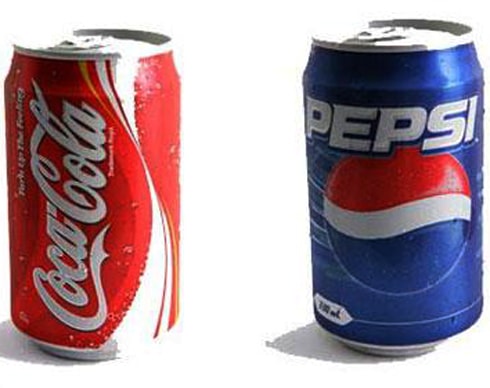Cancer concerns due to colorings in Coca-Cola and Pepsi
The Center for Science in the Public Interest (CSPI) warns that the colorings in Coca-Cola and Pepsi can cause cancer and should be banned. This information was published in many foreign newspapers.
Asiaone.com quoted an announcement from the CSPI center (a non-profit monitoring organization based in the US), saying that the ingredients of two soft drinks Coca-Cola and Pepsi both contain high concentrations of a carcinogen called 4-methylimidazole (4-MIE).
This substance is produced in a chemical reaction between ammonia and sulphites to create the characteristic brown color of this soft drink.
|
Colorings in Coca-Cola and Pepsi soft drinks are accused of causing cancer. Photo:Asiaone.com. |
CSPI said that in the National Toxicology Program (NTP) of the US National Institute of Environmental Health Sciences, scientists have conducted research on the harmful effects of 4-MIE on animals. The results show that this chemical can cause lung, liver, thyroid cancer and leukemia in mice.
After conducting a survey of beverages in Washington, CSPI found that Pepsi soft drinks contained between 145 and 153 micrograms of 4-MI in two 340 ml cans; and two samples of Coca-Cola products also contained between 142 and 146 micrograms per can. Coca-Cola's diet drink (Diet Coke) alone contained between 103 and 113 micrograms of 4-MI per can.
And the CSPI Center alleges that Coca-Cola and Pepsi's 4-MIE is responsible for thousands of cancer cases in the US each year.
Based on this research, California state authorities have required manufacturers to put warnings on all foods and beverages containing more than 29 micrograms of 4-MIE (i.e., a much lower level than the concentration found in the products of the two soft drink companies above).
However, regarding this issue, the US Food and Drug Administration (FDA) said that the current allowable limit of 4-MI in caramel brown colorant is 250 ppm, 1,000 times higher than the concentration found in Coca-Cola and Pepsi products. Thus, mice would have to drink 1,000 cans of soft drinks to reach the level that causes cancer for them.
Sharing the same view, the American Beverage Association argued that CSPI's announcement lacked scientific basis because there is currently no research confirming that 4-MIE can cause cancer in humans. Meanwhile, not all experimental results on animals have the same effect as on humans. And the problem here requires a new epidemiological study to confirm.
SheetABC NewsAlso reported, the two "bosses" of soft drinks, Coca-Cola and Pepsi, still assert that their products are safe and have 4-MIE content within the allowable limit..
But on the other hand, to avoid having to carry a cancer warning label, the state
In addition to cancer, ABC News also mentioned the risk of several health problems for people who drink a lot of soft drinks, including obesity. "If you want to do something good for your health, the only thing you can do today that will have the biggest effect is to cut down on soda and sugary drinks," the article said.
Talk toVnExpress.net, Mr. Nguyen Khoa My, Director of External Relations of Coca-Cola Company in Southeast Asiasaid that all products of the unit currently consumed in the market comply with regulations in every country. Management agencies, including Vietnam
"Coca-Cola disagrees with the decision of the State of California to base its decision on CSPI research to require warning labels for some products containing traces of 4-MEI that are formed when certain foods, including caramel, are cooked. The scientific evidence does not support the State of California's position, which applies only to one US state. There are no health risks in California or anywhere else," Mr. My affirmed.
Responding to a question about whether Coca-Cola had changed the coloring formula in its soft drinks to avoid causing cancer, Mr. My said the company had asked its caramel coloring suppliers to make the necessary adjustments to their production processes to meet California state requirements.
“While we believe there is no health risk resulting from these changes, we are asking our caramel color suppliers to take this step so that our products are not regulated by warnings that have no scientific basis. It is important to note that these adjustments do not change our products,” Mr. My said.
In a statement sent to the media, a representative of PepsiCo Vietnam Company
According to Express







